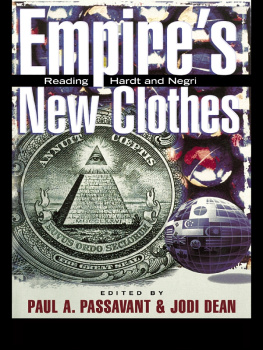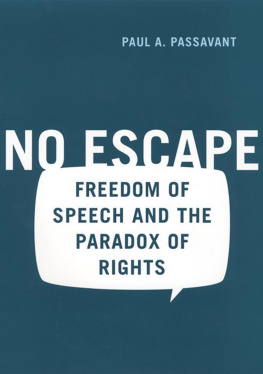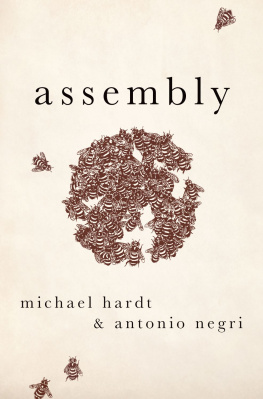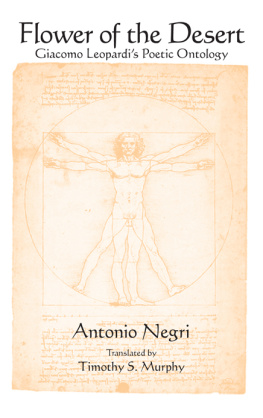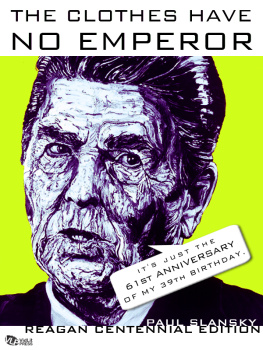Published in 2004 by
Routledge
29 West 35th Street
New York, NY 10001
www.routledge-ny.com
Published in Great Britain by
Routledge
11 New Fetter Lane
London EC4P 4EE
www.routledge.co.uk
Copyright 2004 by Taylor & Francis Books, Inc.
Routledge is an imprint of the Taylor & Francis Group.
This edition published in the Taylor & Francis e-Library, 2005.
To purchase your own copy of this or any of Taylor & Francis or Routledges collection
of thousands of eBooks please go to www.eBookstore.tandf.co.uk.
All rights reserved. No part of this book may be reprinted or reproduced or utilized in any form or by any electronic, mechanical, or other means, now known or hereafter invented, including photocopying and recording, or in any information storage or retrieval system,
without permission in writing from the publisher.
Library of Congress Cataloging-in-Publication Data
Empires new clothes: reading Hardt and Negri/edited by Paul A.Passavant and Jodi Dean
p. cm.
Includes bibliographical references and index.
ISBN: 0-415-93554-7 (hardback: alk. paper)ISBN 0-415-93555-5 (pbk.: alk. paper)
1. Empire. 2. Imperialism. 3. Political science. I. Passavant, Paul A. (Paul Andrew) II.
Dean, Jodi, 1962
JC359.E458 2003
325'.32dc21 2003006590
ISBN 0-203-64400-X Master e-book ISBN
ISBN 0-203-68186-X (Adobe eReader Format)
eISBN: 978-1-13595-089-7
Acknowledgments
We would like to thank our contributors for their efforts to meet an accelerated timeline for this volume. We would also like to thank the editorial and production staff at Routledge for their fine work. We have received excellent research assistance from Matthew Simpson. Ernesto Laclaus chapter, Can Immanence Explain Social Struggles?, originally appeared in the journal Diacritics 31:4 (2001), The Johns Hopkins University Press. It is reprinted with permission of The Johns Hopkins University Press. Parts of Malcolm Bulls chapter, Smooth Politics, appeared in Hate is the new Love, London Review of Books, vol. 23 n. 2, 25 Jan 2001, pp. 234. Thomas Dumms interview of Michael Hardt, Sovereignty, Multitudes, Absolute Democracy, originally appeared in the online journal Theory and Event 4.3 (2000). A shorter version of Representation and the Event also appeared originally in Theory and Event 5.1 (2002). We have published here the longer version that was written in October of 2001 for Theory and Events symposium on September 11. Aside from a few minor editorial changes, it appears here as it was initially written in order to capture that particular moment. We would like to thank the editors of Theory andEvent for their permission to republish these pieces here, and we would like to acknowledge Michael Hardts generosity in this regard as well. Finally, Paul A.Passavant would like to thank Hobart and William Smith Colleges for a Faculty Development grant that facilitated this work.
Introduction
Postmodern Republicanism
Paul A.Passavant
This book was begun well after the end of the Persian Gulf War andcompleted well before the beginning of the war in Kosovo. Thereader should thus situate the argument at the midpoint betweenthose two signal events in the construction of Empire.
Michael Hardt and Antonio Negri, Empire
This collection of critical responses to Empire was first discussed in conversations emerging from panels organized on Empire and on law and globalization at the Law and Society Association Annual Meetings held in Budapest, Hungary, in July of 2001, and at the Critical Legal Conference held at the University of Kent in Canterbury, Great Britain, in early September 2001 (where Antonio Negri took questions via video hookup from Italy). Hence the formation of this collection on Empire crossed the event of September 11.
This volume was sent to the publisher between two other events. On the one hand, the French foreign minister, Dominique de Villepin, drew unprecedented applause before the United Nations Security Council on February 14, 2003, when he stated, against the warmongering of the United States, that the use offeree against Iraq as part of the U.S. war on terror was not justified at this time. The foreign minister argued: [i]n the temple of the United Nations, we are the guardians of an ideal, the guardians of a conscience. This onerous responsibility and immense honormust lead us to give priority to disarmament through peace.
On the other hand, on February 15 and 16, 2003, millions in cities worldwide, including New York City where the United Nations is located, protested the United States rush to war. The size of these demonstrationsthe largest since the Vietnam Warforced coverage from even the sycophantic New York Times.
Much like the book Empire, this book of responses is forged within a context of exceptional global events. Things are now different, we are told incessantly by inescapable talking heads on media. And while we are told that this new timescape began ticking on September 11, many of our contributors share with Hardt and Negri a perception that September 11 merely crystallized conditions and developments that had existed previously. But what are these developments? Are we witnessing the development of Empirea form of global sovereignty and legalityas it is called into being to address the twin threats to global peace posed by Saddam Hussein and George W.Bush, as would appear from the NewYork Times reportage on the European Union described above? Are we witnessing the birth of the multitudea global biopolitical subject of absolute democracyin the bodies mobilized onto the streets through global networks of communication to oppose the United States as the imperial police, also described above? Or are we witnessing not the imperial power of global sovereignty but the repetition of a more familiar imperialist power that the United States is attempting to claim for its own national interests in word, through its 2002 National Security policy, and in deed, through unilateral military action, as some of our contributors suggest? The future is virtually multiple.
Michael Hardts and Antonio Negris remarkable book Empire is academias version of a blockbuster. Not long after it was first published, it was described as the kind of intellectual event that comes along only once every decade or so the Next Big Idea. No earlier publications by Hardt or Negri had become the kind of event Empire had. Conditions in the world have clearly changed in such a way that Empire could be perceived as relevant to it, even if some perceived it to be relevantly dangerous.
Empire is a book about globalization. In the story that Hardt and Negri tell, there are two main charactersEmpire and the multitude. Empire is the form of sovereignty that exists under conditions of globalization. Hardt and Negri respond to the debate over whether global capitalism has caused sovereignty to decline by arguing that while the nation-states sovereignty is indeed waning, this does not mean that sovereignty per se is in decline. Rather, sovereignty has been rescaled from the level of the nation-state to the level of the global. Of course, state institutions continue to exist. But now, when governments intervene to keep the peace, their police forceswhether we are talking about Seattle,

